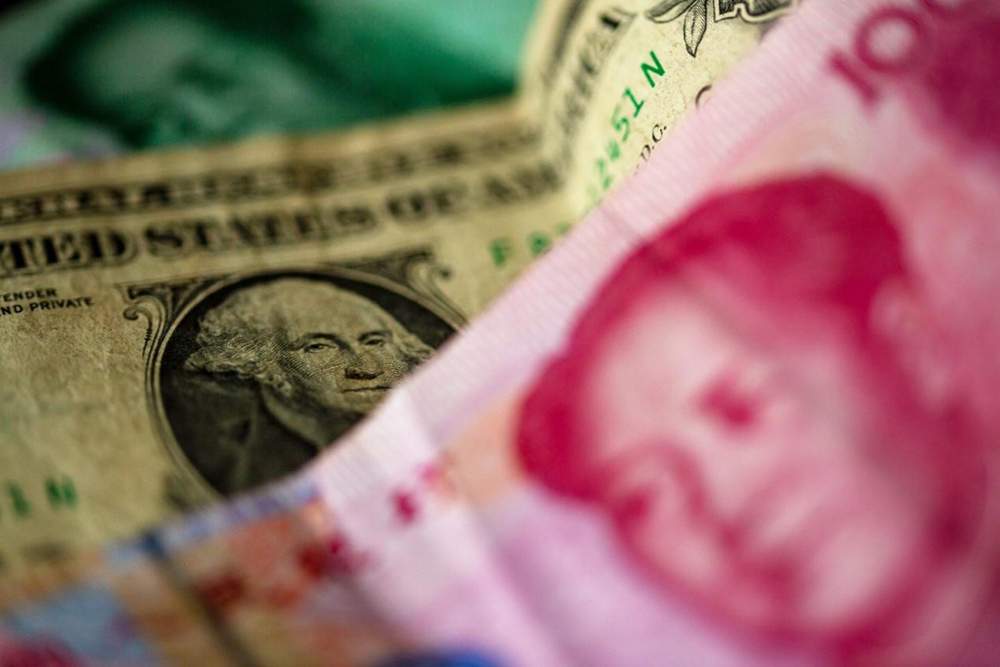
一位知名經濟學家警告,美元的影響力開始下降,人民幣的崛起動搖了美元的全球主導地位。
標準普爾全球評級(S&P Global Ratings)的首席經濟學家保羅·格倫瓦爾德在該評級機構于英國倫敦舉行的一次活動上發言,警告美元“強勢不再”。
據路透社(Reuters)報道,格倫瓦爾德稱他開始看到美元這種全球最具影響力的貨幣“正在從邊緣開始出現裂痕”,他還表示“在非美元世界有事情正在發生”。
格倫瓦爾德的證據包括目前以人民幣結算的交易量。今年3月,人民幣首次超過美元,成為中國跨境交易使用最廣泛的貨幣。
格倫瓦爾德還強調,亞洲基礎設施投資銀行(Asia Infrastructure Investment Bank)和新開發銀行(New Development Bank,原金磚銀行)等銀行,正在增加全球借貸,這進一步提高了人民幣的地位。
俄羅斯的問題
美元面臨的另外一個嚴峻的問題是俄羅斯。
隨著俄烏沖突的爆發,美國對俄羅斯的經濟制裁使其轉向了人民幣。
據彭博社(Bloomberg)報道,自2月以來,隨著中俄兩國建立更加緊密的政治聯盟,莫斯科交易所(Moscow Exchange)的每月交易量主要以人民幣而不是美元結算。
格倫瓦爾德還表示:“美元依舊是領先的全球貨幣,但它不再是占據主導地位的全球貨幣。”
這位標準普爾的專家并非率先提出這種理論的第一人。
上周,諾貝爾獎得主、經濟學家保羅·克魯格曼在《紐約時報》(New York Times)撰文稱:“美元的主導地位不可能永久存在,因為沒有任何事情是永恒的。”
然而,他對去美元化即將來臨的擔憂不屑一顧,他表示這種心態“純屬小題大做”。所謂去美元化是指美元在全球貿易和融資活動中的主導地位下降。
他在文章的最后說:“目前,美元依舊占據主導地位,因為沒有任何好的替代選擇。”
美元依舊占據主導地位
來自美聯儲(Federal Reserve)的數據似乎證實了克魯格曼的說法。
在6月發布的報告中,美聯儲指出,1999年至2019年,在美洲以美元結算的貿易額占比高達96%,在亞太地區占74%,在其他地區占79%。
報告稱:“雖然在過去20年,使用人民幣跨國結算的數量增多,但它依舊低于日元和英鎊。”
武器化
反對美元的一個主要因素是美元被用作對付俄羅斯的武器。
到目前為止,美國對俄羅斯的制裁包括凍結俄羅斯使用一半外匯儲備的能力,并且禁止俄羅斯使用交易入口SWIFT。
4月,美國財政部部長珍妮特·耶倫告訴美國有線電視新聞網(CNN):“我們使用的金融制裁與美元的地位相關聯,可能帶來的風險是美元霸權將被動搖。”
耶倫指出,美元被“審慎地”作為一種工具,她還表示“這是一種非常有效的工具。當然,這確實會讓中國、俄羅斯、伊朗等產生尋找一種替代貨幣的渴望。”
國際貨幣基金組織(IMF)的第一副行長吉塔·古皮納斯表達了類似的擔憂。特斯拉(Tesla)的首席執行官埃隆·馬斯克也擔心美元武器化的影響。
在4月,推特(Twitter)的老板對一條聲稱“去美元化正在快速發生”的視頻做出回應。
太空探索技術公司(SpaceX)的創始人回應道:“如果你過于頻繁地將美元武器化,其他國家就將停止使用它。”
無論美元是否被武器化,其他國家都在想方設法繞開美元。
今年4月,巴西總統路易斯·伊納西奧·盧拉·達席爾瓦在訪華途中問到:“為什么每個國家的貿易都要與美元掛鉤?……是誰決定了美元是(全球的)貨幣?”
他繼續說道:“為什么像金磚銀行這樣的銀行,不能有一種貨幣,為巴西與中國之間、巴西與其他金磚國家之間的貿易提供資金?……今天,各國明明可以用本國貨幣進行出口結算,卻不得不繼續使用美元。”(財富中文網)
譯者:劉進龍
審校:汪皓
一位知名經濟學家警告,美元的影響力開始下降,人民幣的崛起動搖了美元的全球主導地位。
標準普爾全球評級(S&P Global Ratings)的首席經濟學家保羅·格倫瓦爾德在該評級機構于英國倫敦舉行的一次活動上發言,警告美元“強勢不再”。
據路透社(Reuters)報道,格倫瓦爾德稱他開始看到美元這種全球最具影響力的貨幣“正在從邊緣開始出現裂痕”,他還表示“在非美元世界有事情正在發生”。
格倫瓦爾德的證據包括目前以人民幣結算的交易量。今年3月,人民幣首次超過美元,成為中國跨境交易使用最廣泛的貨幣。
格倫瓦爾德還強調,亞洲基礎設施投資銀行(Asia Infrastructure Investment Bank)和新開發銀行(New Development Bank,原金磚銀行)等銀行,正在增加全球借貸,這進一步提高了人民幣的地位。
俄羅斯的問題
美元面臨的另外一個嚴峻的問題是俄羅斯。
隨著俄烏沖突的爆發,美國對俄羅斯的經濟制裁使其轉向了人民幣。
據彭博社(Bloomberg)報道,自2月以來,隨著中俄兩國建立更加緊密的政治聯盟,莫斯科交易所(Moscow Exchange)的每月交易量主要以人民幣而不是美元結算。
格倫瓦爾德還表示:“美元依舊是領先的全球貨幣,但它不再是占據主導地位的全球貨幣。”
這位標準普爾的專家并非率先提出這種理論的第一人。
上周,諾貝爾獎得主、經濟學家保羅·克魯格曼在《紐約時報》(New York Times)撰文稱:“美元的主導地位不可能永久存在,因為沒有任何事情是永恒的。”
然而,他對去美元化即將來臨的擔憂不屑一顧,他表示這種心態“純屬小題大做”。所謂去美元化是指美元在全球貿易和融資活動中的主導地位下降。
他在文章的最后說:“目前,美元依舊占據主導地位,因為沒有任何好的替代選擇。”
美元依舊占據主導地位
來自美聯儲(Federal Reserve)的數據似乎證實了克魯格曼的說法。
在6月發布的報告中,美聯儲指出,1999年至2019年,在美洲以美元結算的貿易額占比高達96%,在亞太地區占74%,在其他地區占79%。
報告稱:“雖然在過去20年,使用人民幣跨國結算的數量增多,但它依舊低于日元和英鎊。”
武器化
反對美元的一個主要因素是美元被用作對付俄羅斯的武器。
到目前為止,美國對俄羅斯的制裁包括凍結俄羅斯使用一半外匯儲備的能力,并且禁止俄羅斯使用交易入口SWIFT。
4月,美國財政部部長珍妮特·耶倫告訴美國有線電視新聞網(CNN):“我們使用的金融制裁與美元的地位相關聯,可能帶來的風險是美元霸權將被動搖。”
耶倫指出,美元被“審慎地”作為一種工具,她還表示“這是一種非常有效的工具。當然,這確實會讓中國、俄羅斯、伊朗等產生尋找一種替代貨幣的渴望。”
國際貨幣基金組織(IMF)的第一副行長吉塔·古皮納斯表達了類似的擔憂。特斯拉(Tesla)的首席執行官埃隆·馬斯克也擔心美元武器化的影響。
在4月,推特(Twitter)的老板對一條聲稱“去美元化正在快速發生”的視頻做出回應。
太空探索技術公司(SpaceX)的創始人回應道:“如果你過于頻繁地將美元武器化,其他國家就將停止使用它。”
無論美元是否被武器化,其他國家都在想方設法繞開美元。
今年4月,巴西總統路易斯·伊納西奧·盧拉·達席爾瓦在訪華途中問到:“為什么每個國家的貿易都要與美元掛鉤?……是誰決定了美元是(全球的)貨幣?”
他繼續說道:“為什么像金磚銀行這樣的銀行,不能有一種貨幣,為巴西與中國之間、巴西與其他金磚國家之間的貿易提供資金?……今天,各國明明可以用本國貨幣進行出口結算,卻不得不繼續使用美元。”(財富中文網)
譯者:劉進龍
審校:汪皓
The power of the greenback may be beginning to fade and is being pushed down the global pecking order by the rise of the Chinese yuan, a top economist has warned.
Speaking during an S&P Global Ratings event in London, Paul Gruenwald the rating firm’s chief economist, cautioned that the dollar “doesn’t have quite the pull it used to.”
According to a Reuters report, Gruenwald said he was beginning to see “fragmentation around the edges” of the globally influential currency, adding that “things [are] happening outside of the dollar world.”
Gruenwald’s evidence included the number of transactions now being carried out in yuan—overtaking the dollar for the first time in March to become the most widely used currency for cross-border transactions in China.
Likewise, Gruenwald highlighted banks like the Asia Infrastructure Investment Bank and the New Development Bank—formerly known as the BRICs bank—are ramping up global lending, further putting the Chinese currency front and center.
The Russia problem
Another major issue facing the dollar is Russia.
U.S. economic sanctions imposed on the country for its invasion of Ukraine saw the nation turn to the yuan, also referred to as renminbi.
Since February, the monthly trading volumes on Moscow Exchange were predominantly conducted in yuan instead of dollars, Bloomberg reported, with the two nations also forming closer political ties.
“The U.S. (dollar) will continue to be a leading world currency, (but) it will no longer be the dominant world currency,” Gruenwald added.
The S&P expert isn’t the first to voice this theory.
Last week Paul Krugman, a Nobel Laureate and economist, wrote in the New York Times that “the greenback’s dominance won’t last forever, because nothing does.”
However, he brushed off fears that de-dollarization—the reduction of the dominance of the dollar in global trade and financing activities—is imminent, adding it was “much ado about nothing.”
“For now, the dollar dominates because there just aren’t any good alternatives,” he finished.
Dollar still dominates
According to data from the Federal Reserve, that certainly seems to be the case.
In a June release, the Fed pointed out that over the period of 1999 to 2019, the dollar accounted for 96 percent of trade invoicing in the Americas, 74 percent in the Asia-Pacific region, and 79 percent in the rest of the world.
“While international usage of the Chinese renminbi has increased over the past 20 years [it] remains even behind the Japanese yen and British pound,” it adds.
Weaponization
A major factor working against the dollar is its weaponization against Russia.
Sanctions thus far have included freezing Russia’s ability to use half of its reserves as well as hamstringing its access to the transaction portal SWIFT.
In April, Treasury Secretary Janet Yellen told CNN: “There is a risk when we use financial sanctions that are linked to the role of the dollar that over time it could undermine the hegemony of the dollar.”
Yellen caveated that the dollar is used as a tool “judiciously,” adding: “It is a very effective tool. Of course, it does create a desire on the part of China, of Russia, of Iran to find an alternative.”
As well as the IMF’s First Deputy Managing Director, Gita Gopinath, voicing similar concerns, Tesla CEO Elon Musk is also wary of the impact of weaponizing the currency.
In April the Twitter owner responded to a video claiming “de-dollarization is real and is happening fast.”
The SpaceX founder replied: “If you weaponize currency enough times, other countries will stop using it.”
Weaponization or not, other countries are looking into ways to circumnavigate the dollar.
In April, while on a trip to China, Brazilian President Luiz Inacio Lula da Silva asked: “Why should every country have to be tied to the dollar for trade?… Who decided the dollar would be the (world’s) currency?”
Lula da Silva continued: “Why can’t a bank like the BRICS bank have a currency to finance trade between Brazil and China, between Brazil and other BRICS countries?… Today, countries have to chase after dollars to export, when they could be exporting in their own currencies.”






